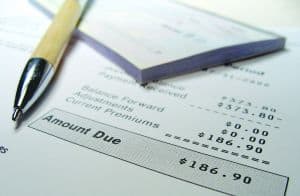Spring Cleaning Your Finances: Tax Time and Investment Assessment

Most people do a huge spring cleaning every year where they deep clean, donate, and organize their homes. But how many people apply the same spring cleaning mentality to their finances? We bet not many people do, and if you don’t — you should. When you’re planning to spring clean your house, consider also spring cleaning your finances so that you can start fresh for the coming year.
Going through your finances can seem intimidating and time-consuming. However, it’s essential if you want to stay on track to meet your long-term financial goals.
Consider what you can do now to prepare for your future.
Organize Your Financial Documents
The first step in spring cleaning your finances is understanding the current state of your money. To do that, you should gather all of your financial documents and organize them. Documents to organize include:
- Bank statements
- Investment account statements
- Retirement account statements
- Credit card statements
- Credit reports
- Legal documents
- Paystubs or invoices
You can organize the physical copies of these documents in a folder or filing cabinet. However, you can also scan the physical copies and save them to a folder on your computer. Either way, make sure you can review and compare the documents.
As you go through your finances, you may need to reference different documents to make decisions. Having them in one place means you can assess your investments and expenses quickly.
Check on Your Investments
Once you gather your financial documents, take a look at how your investments are performing. Consider any goals you had for your investment income and if you met those goals.
Then, you can change your portfolio to reach your new investing goals. If one investment didn’t perform as well as you hoped, you could move some of that money to a better investment.
By checking on your investments, you can make sure they are helping you toward your future goals. Depending on how you set up your investments, there are a few ways you can do this.
Meet with your financial advisor
If you work with a financial advisor on any of your investments, schedule a meeting to discuss your portfolio. Your advisor can answer any questions you have about how your investments are performing.
They can also recommend any changes to your portfolio to help you align with your goals. Are you looking for more dividend-producing investments, long-term growth, options, futures, or short-term income? Tell your professional what you have in mind, and they can assist you in deciding where to put your money.
If you haven’t worked with a financial advisor, you might want to start. This is what they do for a living, and when it comes to money, you want to make the best choices you can.
Review your statements
Whether you work with a financial advisor or not, you should look at your investment statements. Use the statements to determine how much money you invested over the last year. Compare that to how much investment income you earned.
You can also compare each statement to any major events that happened in the past year. While one investment may have performed poorly, consider if that has to do with outside factors.
After you review your statements, you can decide if you want to maintain the same investment strategy. If you want to change something, use the information you gather to try new things.
Consider your risk
You should also evaluate your investment risk each year. If you want to use your investment income for something in a few years, you may want to switch to a lower-risk portfolio.
However, if you have enough investments like that, you can add new investments to a portfolio with a higher risk. You can potentially earn a lot more money that way, but it’s also important to diversify by combining investment risks.
If you’re investing with retirement in mind and you’re young, you may want to have a portfolio on the riskier side for potentially higher returns. On the other hand, if you’re investing for passive income, you may want to choose less risk because you’re counting on that money to live.
Automate Your Investments
Another thing to consider when spring cleaning your finances is how you can make investing even easier. You can use tools like the Acorns app to invest your spare change when you make a purchase automatically.
Another option is to set up a direct deposit to your investment account. Whenever you get a paycheck, you can route part of it to your investments.
You can also set a reminder to transfer money to your investment accounts each month. While it’s not completely automatic, it can help you remember to invest. You can remind yourself how much to invest, so you can help reach your goals. These amounts don’t have to be huge, either, but regular investing will keep you in the habit.
Add a New Income Stream

If you want to make more money this year, a great way to do that is with an additional income stream. Whether you have a full-time job or work for yourself, you can make money on the side.
Investing can be a great way to earn money, but you don’t have to limit yourself to it. You can look into other passive income options, such as creating an online course or self-publishing a book. Once you create the course or book, you can sell it over and over.
When you start making passive income, you can use that for your bills or put it into your investments. Then, you can increase your income now and in the future.
Consider adding an income stream you enjoy doing. That way, you won’t feel stressed if you don’t make a lot of money right away. Passive income won’t come overnight, but it’s something to consider adding to your financial life.
RELATED READS: How to Achieve Financial Freedom
Research Tax Breaks
You should also look into spring cleaning your finances so that you can make tax time easier. Tax deductions and credits exist for almost anything, and they change year to year. So, the best thing to do is consult a professional toward the beginning of the year. That way, they can advise you on steps you can take that will help your tax bill at the end of the year.
You can find tax deductions that you can use as an investor to reduce your taxable income. But you can also look for tax deductions and credits for other financial situations.
Keep in mind whenever to realize gains by selling investments, it’s taxable income, and you’ll have to include it on your taxes. So, before you sell anything, think about how it will affect your bottom line.
With that in mind, consider some expenses you may be able to deduct as an investor.
Accounting fees
If you hire an accountant to handle your taxes, you can deduct some of the fees you pay for that. However, you have to be self-employed to deduct those costs.
Accounting is a business expense so that you can deduct it from your business profit. Even if your business is part-time, you can still ask your accountant about the deduction.
Interest expenses
You may also be able to deduct money that you spend on expenses for investing activities. One way you can do this is if you borrow money to pay for investments. You can deduct the margin interest expense.
However, you do have some limitations. You can’t deduct more than your net investment interest. If you borrow more than that, you can’t deduct the entire amount.
Consider talking to a tax accountant to decide if this is the best option for you.
Legal fees
Depending on the legal fees you have and your situation, you may be able to deduct them. For one, you may need to be self-employed, especially if you want to deduct business legal fees.
However, anyone can deduct the legal fees you pay a tax attorney for resolving a tax issue.
Safe-deposit rental fees
Consider where you store your investment documents and if you use a safe deposit box. If you keep a copy of your investment documents in a deposit box, you may be able to deduct your rental cost.
You should talk to an accountant to make sure that you can deduct the expense. After all, they’re the experts, and you don’t want to get into tax trouble.
Turn Dividends Into Ordinary Income
The IRS taxes the dividends you receive at a much higher rate than ordinary income, so consider changing those dividends into ordinary income.
But qualified dividends and ordinary dividends are not the same and, depending on your expenses, you may not want to convert them. To take advantage of this possible tax break, consult a professional.
Review Ongoing Expenses

The next step in spring cleaning your finances is to go through your monthly or annual expenses. Take a look at any subscriptions you have or other purchases you make regularly.
Consider if there are any subscriptions that you no longer use. If so, cancel those subscriptions or downgrade to a lower-cost plan.
When it comes to purchases, like a daily trip to the coffee shop, try to cut back. You don’t have to get rid of everything, but you should figure out where you can save money.
Then, you can put those savings into your investments to increase your investment income. Over time, you may be able to justify spending more on things when you earn more money.
Switch Banks
You can also spring clean your finances by switching to a different bank. Switching banks can be especially helpful if your current bank charges high fees or has low-interest rates on savings accounts and other investment accounts.
Consider local and national banks with branches near you. You can also look into credit unions, which are non-profit, so they can offer lower fees and higher interest rates.
If you find a bank with better rates, you can move some or all of your accounts there. However, you don’t need to switch banks every year. Consider how much you can save by switching to decide if it’s worth your time.
Close unused accounts
If you do switch banks, you may want to officially close your old accounts instead of taking out the money. You should also close any old investment accounts you don’t use.
Keeping old accounts open can make it harder to manage all of them. Then, you could increase your risk of someone hacking into one of the accounts and stealing your identity.
However, you may not want to close old credit cards. Doing that can lower your overall credit limit. So if you don’t reduce your spending, closing a credit card may negatively affect your credit score.
Set New Goals
When spring cleaning your finances, you should consider your financial goals for the coming year. Consider how much money you want to make overall and from your investments.
Think about your expenses, such as housing, food, and transportation. You should also set goals for how much you want to invest and how much to put in savings.
As you make financial decisions throughout the year, you can refer to your goals. That way, you can make choices to help guide you in the right direction.
Great financial goals to set include paying off debt or building your emergency fund. Once you do that, you can put all of your extra money into your investment accounts.
Create a New Budget
After you figure out your financial goals, you can set a budget for the year. As your income and expenses change, you may not be able to use the same budget as you have in the past.
You can list out your fixed expenses for housing and utilities. Then, you can estimate how much you’ll spend in other areas. Once you list out those things, you can budget for more fun expenses, like entertainment.
But make sure you have a budget for investing. That way, you can invest more each month, and you won’t have to worry about having the money for it.
Spring Cleaning Your Finances

Whether you rely primarily on investments or have a job as well, spring cleaning your finances is essential. You can learn a lot by going through your statements, and you can make necessary adjustments.
Then, you can make the most of your tax return and set yourself up for a better financial future. Make sure you check on your finances at least once each year to help you reach your goals.






